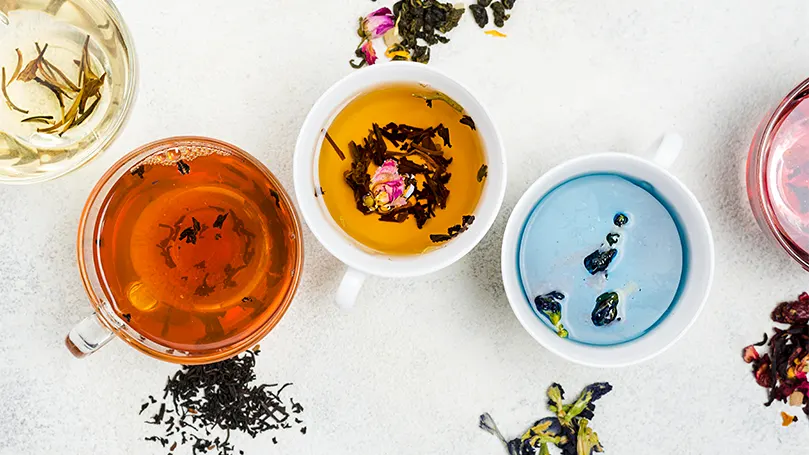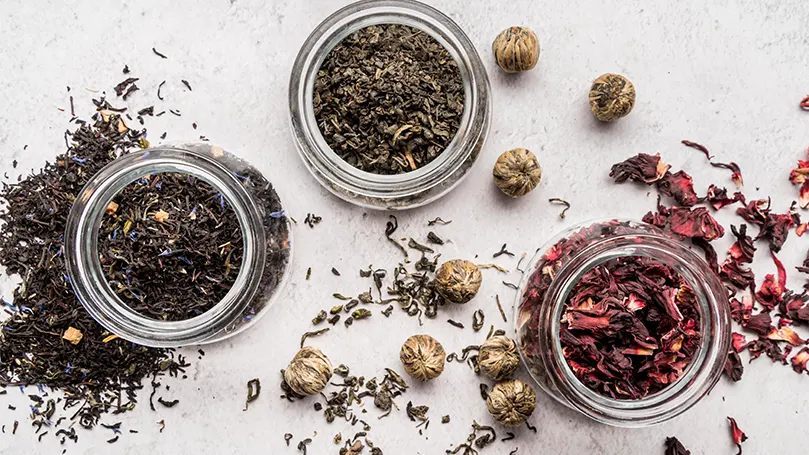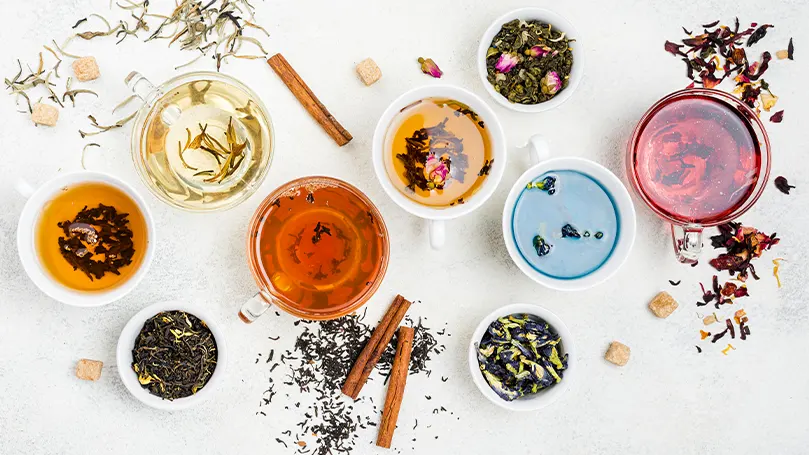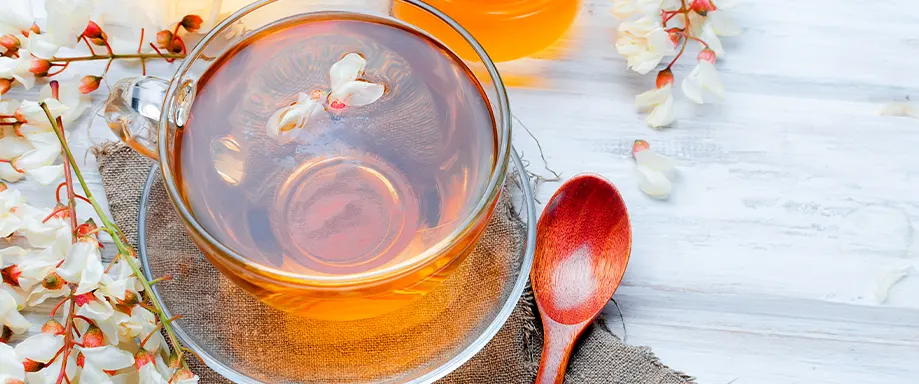Why is herbal tea good for sleep?
Before we start listing off the different tea types and determining which one is the best, let's talk about how drinking tea helps you fall asleep in the first place. As you'll soon see, herbal teas in particular offer quite a few benefits that help you fall asleep and even improve sleep quality overall. So, let's see exactly how it manages to do this!
Sedative nature
Due to various compounds found in certain herbal teas, having a cup of tea at night can act as a mild sedative. This is most evident with Valerian root tea and you can find quite a few “sleep teas” that focus on these sedative characteristics.
It's worth pointing out that the sedation is very mild and on its own, it's debatable whether it would help that much. However, these compounds when combined with everything else we're going to talk about, can in fact help some people drift off to sleep a lot more quickly.
Eases the tension

Stress affects sleep in rather significant ways. This is why people commonly can't get rest before their job interview or after they had had a very difficult day. Luckily, however, teas have been shown to ease the tension.
For example, in a study, Lavender tea has been shown to help with heightened cortisol levels as well as anxiety and depression. That being said, more research needs to be done on the topic, as the evidence isn't always 100% conclusive. Nevertheless, many of the participants have experienced positive effects!
No caffeine
When we discussed how much caffeine there is in tea, we pointed out that herbal teas are the only ones that can have 0 caffeine whatsoever! And even when caffeine is present, it's in such small quantities that it's highly unlikely to affect your sleep.
And while not having caffeine won't directly help you fall asleep, it's still worth pointing out. After all, caffeine is in a lot more drinks than you'd think. From coffee to some sodas, having a drink in the evening can be a minefield. So, just drink chamomile tea and don't worry about it!
Makes for a great routine
Having the best bedtime routine means having something relaxing you can do every night. And as we've just mentioned, herbal tea makes for the perfect choice! After all, it has no caffeine, it helps calm you down and is generally delicious.
Plus, having it as part of your bedtime routine comes with some added perks. Namely, your brain will start associating herbal teas with sleep. Thus, if you're drinking lavender tea every night, it can serve as an off-switch that will promote sleep. Definitely worth looking into, especially if you're having difficulties falling asleep on your own. Just make sure that you also have the perfect mattress to go along with it, as there's a limit to how much herbal tea can help on its own.
Helps with other medical conditions
If you weren't already planning to drink tea every night, this might be the section that wins you over. Although these facts aren't always 100% set in stone, plenty of research does suggest that some herbal teas can offer substantial health benefits.
- Chamomile tea has been shown to help with menstrual pain.
- Peppermint tea has been shown to help with Irritable Bowel Syndrome.
- Hibiscus tea has been shown to help with kidney/urinary stones.
These are only a few examples but they should get the point across. All of these conditions can keep you awake at night. After all, falling asleep isn't easy if you're in pain. So, by helping calm these conditions even a little, herbal teas can indirectly improve your sleep quality.
What kinds of herbal tea can you get?

The fact of the matter is that there are a lot of different teas. From the basic categories, like green tea, black tea, oolong tea, white tea, and herbal tea, down to specific tea types. There's a lot to go over. In fact, just for herbal teas alone, we found a website that listed 50 different types!
And it can be difficult to determine the best teas for sleep if you don't even know how many herbal teas exist in the first place. So, we're going to try and list some of the more common herbal teas that you can find in the UK and maybe include in your daily routine!
- Lemon balm tea
- Peppermint tea
- Cranberry tea
- Jasmine tea
- Hibiscus tea
- Chamomile tea
- Lavender tea
- Honeybush tea
- Valerian tea
- Sage tea
- Eucalyptus tea
- Ginger tea
- Rooibos tea
- Cota Navaho tea
As you can see, there are more tea bags than stars in the sky – or at least it can feel that way. And if you've only been drinking chamomile tea your entire life, you're missing out on dozens of other herbal teas you could potentially enjoy even more!
What is the best herbal tea for sleep?
Now that you know how herbal teas can help you sleep, and have a rough idea of the many different herbal tea types, let's get to the titular question – what is the best herbal tea for sleep?
Of course, this isn't a one-size-fits-all question and different people can react to different herbal teas in different ways. However, as a general rule of thumb, we'd say that the following few herbal teas are the most likely to help you doze off and stay asleep.
Chamomile tea
Chamomile tea is one of the most popular herbal tea types and we think it deserves that title. Research suggests that it helps you calm down and even fight your demons to an extent (like with generalised anxiety disorder). Plus, if you commonly have an upset stomach at night, it can make it a lot easier to fall asleep.
Not to mention that it's also incredibly popular. This means that you can find it just about anywhere and usually don't have to pay all that much in order to get it. So, in terms of making tea time your evening routine, chamomile tea is the easiest one to implement.
Valerian root tea

Drinking valerian root tea is almost on the same level as taking sleep medication. This is because valerian root is actually used for certain medications and sleep supplements! And while it's hard to say whether it's as potent in tea form, the research seems promising.
Namely, in most studies that looked at the influence valerian had on sleep quality, the results have been positive. In fact, when compared with the placebo group, participants who had valerian tea were two times more likely to have a good night's sleep. And we'd say those are pretty good odds – especially when you're just sipping on some delicious tea.
Lemon balm tea
While it's likely not as popular as the previous two, lemon balm tea is another very beneficial herbal tea. It's mostly used in order to reduce anxiety and calm people down. However, research has shown that it has some added benefits in specific cases.
For example, one study found that lemon balm tea can help postmenopausal women in bettering their sleep quality. And a different study concluded that lemon balm tea can also help those with chronic stable angina (CSA). Of course, a cut of tea can completely suppress serious medical conditions or issues but it's worth knowing that it can help a bit.
Lavender tea
Like a few of the teas so far, lavender is an anxiolytic, meaning that it helps with relieving anxiety. And just like Valerian tea, it actually sees medical use outside of just teas – in this case in aromatherapy.
And, you guessed it, research does suggest that Lavender tea helps you sleep. To be precise, the study indicated that when combined with proper sleep hygiene, participants were more likely to have a good night's sleep. Although it's worth pointing out that sleep quality was the only big differentiator, as sleep duration remained generally unchanged.













There are no comments yet
"*" indicates required fields